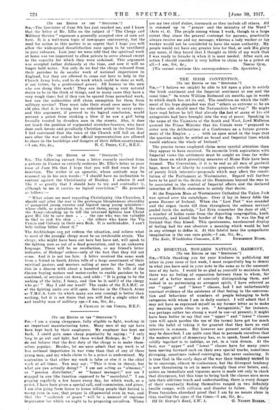THE IRISH CONVENTION.
[To THE EDITOR Or TILE " SPECTATOR."] SIR,—" I believe we (might) be able to hit upon a plan to satisfy the Irish sentiment and the Imperial sentiment at one and the same time." So wrote William Redmond six months ago in words to which death has set its seal. The condition on which the fulfil- ment of his hope depended was that "others as extreme as he on the other side should meet the Nationalists half-way." He might have read before he fell that already the feet of sunny of his old antagonists had been brought into the way of peace. Speaking, in the name of the Unionists of the South and West, Lord Midleton assured the Prime Minister that his friends were " prepared to enter into the deliberations of a Conference on a future govern- ment of the Empire . . . with an open mind in the hope that the question might be settled on broad and Imperial lines which would embrace the whole of Ireland."
The precise terms employed claim more careful attention than they appear to have received. To reconcile Irish aspirations with Imperial views the settlement must be sought on lines far wider than those on which preceding measures of Home Rule have been framed. The Convention, if it is to end as all men of goodwill hope, must be at liberty to consider proposals outside the range of purely Irish interests—proposals which may affect the consti-. tution of the Parliament at Westminster. Regard will further have to be paid to the desire of the Dominions beyond the seas to be associated in the control of Imperial affairs and the declared intention of British statesmen to satisfy that desire.
At the Requiem Mass at Westminster Cathedral the Union Jack was spread over the catafalque. Over it lay in heavy folds the green Banner of Ireland. When- the " Last Post " was sounded and the organ (mute till then throughout the solemn service) pealed forth the melody, " Let Erin remember the days of old," a number of ladies came from the departing congregation, knelt reverently, and kissed the :border of the flag. It was the flag of Ireland that they kissed. This spontaneous, unrehearsed display of feeling had for one observer a meaning which would be lost in any attempt to define it. At this fateful hour the sympathetic imagination is the one sure guide.—I am, Sir, &e., The Heir, Wimbledon Common, S.W. RICHARDSON EVANS. •


































 Previous page
Previous page